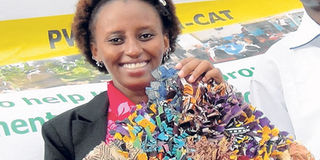Give us waste cloth, we’ll make doormats

Phoebe Wanjiku displays a hand-woven doormat. PHOTO | MORAA OBIRIA
What you need to know:
- Aged between 18 and 28, many of the group members just finished high school while others are in college and therefore they face a challenge getting capital to buy fabrics of their own choice, which they could come up with new and better designs of doormats.
- Each doormat measuring 50cm by 50cm goes for Sh800 and the members make up to four pieces a day. Each gunny bag helps produce four doormats.
- The group uses social media to market its products. They also employ door to door marketing besides getting referrals from previous customers.
Tailors may be quick to throw them into the dustbins but wait a minute! Would the many pieces of different types of fabric make up something pretty?
A group of youth from Mombasa are turning this into a reality. They are making doormats that are comfortable to sooth your feet once you walk into your house.
And while they contribute to reducing the amount of waste scattered in the coastal town’s environment, crocheting doormats using the large scraps of fabrics leftover from a different tailoring jobs is turning out to be not just an eco-friendly, but a profitable venture.
The 15-member group, which is funded by Uwezo Youth Development Programme, aims at promoting protection and the preservation of a clean environment.
The waste, which when turned into re-usable products cuts down on emission of carbon-dioxide, a gas that is responsible for increasing global warming and whose impacts are heavily being felt in Kenya.
FREE FABRIC
“Recycling pieces of fabric is a simple way of protecting the environment. We cut effects of climate change since burning of waste cloth releases carbon dioxide into the air,” says Phoebe Wanjiku, a member of the group.
Started in 2011, each member collects pieces of fabric from tailoring shops in Mombasa and its environs, which Ms Wanjiku says are in plenty.
They get the pieces of fabric for free. All they need is a gunny bag which goes for Sh10, a crocheting needle sold at Sh5 and a thick woollen thread that goes for Sh150 a roll.
Once the gunny bags are cleaned, they are then cut into pieces of 50cm by 50cm before sewing the strips of cloth. “Each member decides on the kind of pattern to draw on the doormat,” she says. “It can be the pattern of an animal, a flower or anything attractive that a member desires. At the moment, however, we are currently not doing large drawings,” she adds.
One creates knots on the patterns upon which the fabric is sewn. Ms Wanjiku says they are only limited to work with the materials they collect.
“All you can do is to mix them according to your taste. Our main challenge is having a variety to choose from,” she says.
Aged between 18 and 28, many of the group members just finished high school while others are in college and therefore they face a challenge getting capital to buy fabrics of their own choice, which they could come up with new and better designs of doormats.
Each doormat measuring 50cm by 50cm goes for Sh800 and the members make up to four pieces a day. Each gunny bag helps produce four doormats.
The group uses social media to market its products. They also employ door to door marketing besides getting referrals from previous customers.
On Saturday, they meet to evaluate their progress and use the opportunity to collect their weekly savings.
“But when a member gets an order, he informs the group: we collect mats from members and sell collectively,” says Mr Benard Otieno, a member.
GREENING THE TOWN
The group has capped savings at Sh100 per week for every individual.
Although, their current savings is Sh34,000, their plan in the next three years is to launch a school for training youth on how to capitalise on available waste to make money while at the same time conserving the environment.
Fred Onyango, who is in charge of marketing the doormats says many people at the coast love art, a preference which has boosted the group’s sales among the residents in Mombasa.
“There is a lot of excitement when people see what we do. But above all, they buy and this encourages us to continue making more products,” says Mr Onyango.
Even though their efforts are yet to match with their vision of a totally clean environment in Mombasa town, they are happy with the progress achieved so far.
As a way of taking back to the society, the 15 members are involved in training pupils and students on the importance of protecting the environment.
Uwezo youth development programme is among the 50 groups making up the Kenya climate action teams with members drawn from across the county.
Among its core activities is to initiate projects aimed at conserving the environment and sensitising communities on the benefits of a clean habitat.





